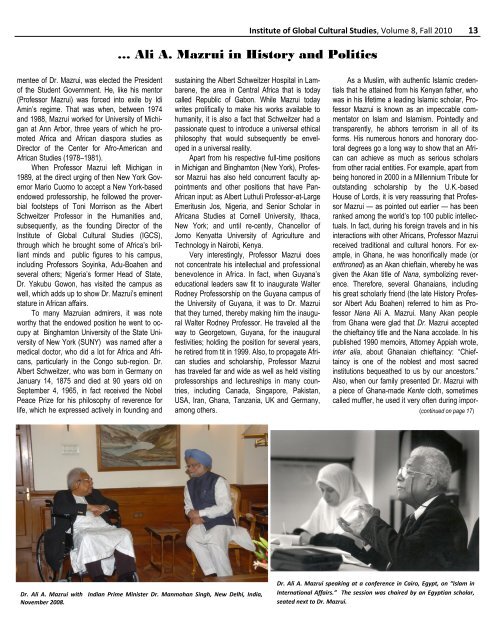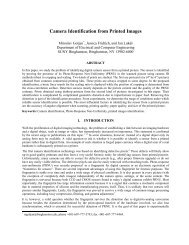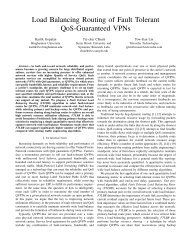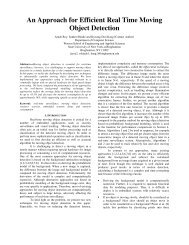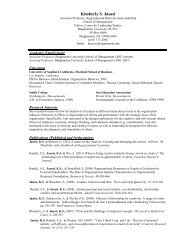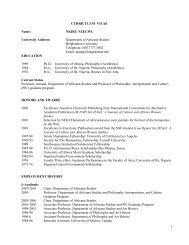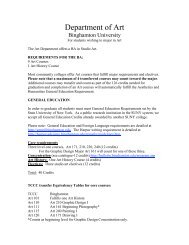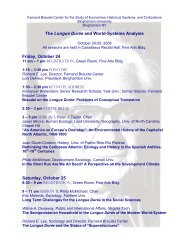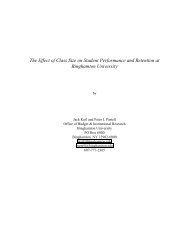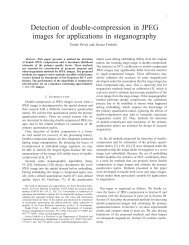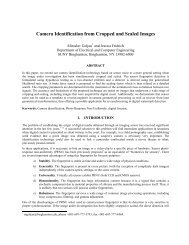12 Institute of Global Cultural Studies, <strong>Volume</strong> 8, <strong>Fall</strong> <strong>2010</strong>… Ali A. Mazrui in History and Politicsdeath of the poet, Okigbo. At the time of hisdeath in the Biafran war, he had published onlywhat critics saw as a slim volume of poems, titledLabyrinths. Yet, he was seen in celebrated poetrysense. It was, therefore, not surprising that oneof Africa‘s best writers, Professor Chinua Achebeof Things <strong>Fall</strong> Apart fame, wrote in 1978 thatOkigbo was not only the finest Nigerian poet ofhis generation, but that as his poems becomewidely known internationally, ―he will also be recognizedas one of the most remarkable anywherein our time.‖Another African writer, Lewis Nkosi, had theopportunity to interview Okigbo in 1962. Seeinghim as a poet‘s poet, Nkosi saw skepticism ofOkigbo‘s that his true poetic audience in Africawould be limited, adding that he believed he was―writing for other poets all over the world to readand see whether they can share in my experience.‖It was the unique experience that promptedhis older friend, Professor Mazrui, to write thenovel.In retrospect, many African scholars andreaders have offered opinions on ProfessorMazrui‘s ―Leninist Czar‖ essay, published in TransitionMagazine (1966). Many of them discussedthe ideological implications, as they wondered ifa socialist scholar would have written whatMazrui wrote. They, however, did not look at howwell researched and comparative, in conclusions,the piece was, as Mazrui started his essay with acomparison of several aspects of Lenin‘s works.For example, he wrote that Nkrumah‘s first book,Toward Colonial Freedom, ―was inspired byLenin‘s theory of imperialism … Nkrumah‘s lastpublication in office is Neo-Colonialism: The LastStage of Imperialism,” was inspired by Lenin‘stheory of imperialism.All of the foregoing assessments did notcause any ripples for Dr. Mazrui‘s African readersuntil they saw his other polemical assertions(of which Mzee Mazrui is famous), including thisone: ―There is little doubt that Nkrumah saw himselfquite consciously as an African Lenin. Hewanted to go down in history as a major politicaltheorist, and he wanted a particular stream ofthought to bear his own name.‖ Hence the term―Nkrumahism‖ … he also sought to be Ghana‘sCzar. Seeing Nkrumah as an authentic Africanleader or writer, his supporters or admirers didnot take kindly to these assertions. Other critics,who sided with Mazrui‘s tantalizing essay, alsowondered if the award of the Lenin Prize toNkrumah by the then Soviet leaders did not confirmtacitly that he either wanted to be or enjoyedto be seen in Leninist terms. All of these discussions,no matter the motives of the writer (i.e.,Mazrui) and the discussants, did contribute immenselyto African historical as well as politicalstudies, and the originator of the same (Mazrui)should be applauded for the discussions.It is a known fact that Professor Mazrui is athis best when his writings raise or introduce controversy,as he would handily face his critics withmethodical and purposeful debate, very often witha very civilized approach. From that, youngergenerations of African writers have benefitted and,in the end, grown or influenced to become seasonedscholars, campus professors and writers.Mazrui’s Black Diaspora-Cum-Pan-African Forays; His Contributionsto Pax-Africana and Beliefin African Cultures and TraditionsIn fact, the exemplary and distinguishedachievements of Professor Mazrui often remindus of some of the axiomatic anecdotes of theReverend Jesse Jackson, Sr., of Rainbow Coalitionfame. Often, when speaking to black youth,the ordained Minister would urge them to leaveall distractions as well as family shortcomingsbehind and, instead, to strive to become ―Somebody‖in life. In his preacher‘s voice, he woulddraw all sorts of analogies for the benefit of theyoungsters; he would say to the youngsters; thatsome of them felt or thought that having beenborn in a ghetto should be a barring factor towardtheir growth and aspirations, and urging themfurther: ―You might have been born in a ghetto,but always remember that the ghetto is not inyou, just as when a pregnant dog enters an ovento deliver its babies, we do not call them biscuits,but we still see them as puppies.‖ Malcolm X,too, used the analogy of a cat giving birth in anoven: the babies produced by the cat were stillkitten but not biscuits. Drawing on the wise wordsof Rev. Jackson and Malcolm X, therefore, boilsdown to the fact that Dr. Mazrui was, for example,born in Mombasa, Kenya, an African countrythat would, in the early 1960s, be known for itsviolent anti-colonial indigenous organizationcalled the Mau-Mau movement. In fact, in hisbiographical anecdotes, it is often indicated thatthe young Mazrui (born on February 24, 1933)studied at schools in Mombasa, in Kenya.No matter the amenities that the Mombasaschools lacked, young Mazrui was so determinedthat he went on to the United Kingdom, where heenrolled at University of Manchester to earn hisBachelor of Arts (B.A.) degree in 1960 with distinction,his Master of Arts (M.A.) degree in 1961from an Ivy League institution (Columbia University)of New York City, USA, followed by his Doctorof Philosophy (D. Phil.) degree in 1966 fromNuffield College, University of Oxford. The immediatequery is whether or not Mazrui, upon bagginghis terminal Oxford D. Phil. degree (withMolly, an English spouse in tow) made him a―Westerner‖, abandoned Mother Africa for thegreener pastures of the Western World or, inessence, failed to return to Africa to contributehis economic and intellectual quota? No, he didnot do so. If anything, he would return to Africa,via Uganda, to begin his great teaching careerand distinguished scholarship!Therefore, we can answer the query that hedid not exactly disappoint Mother Africa! Instead,the African Patriot in the young Dr. Mazrui (justlike the patriotism of Ghana‘s Uncle Joe andother nationalist leaders) took over for him to reurnto the Motherland via Makerere University;indeed, he reminds us a lot of this same seriousAfrican patriot, ―Uncle‖ Joe Appiah of Ghana thatwe mentioned earlier and above. Attorney Appiah— who can as well be described like Dr. Mazruias a public intellectual — wrote the great memoir,African Patriot; the U.K.-trained Attorney (or Lawyer)was so transparently patriotic and Africanthat many of his Ghanaian compatriots verystrongly harbor the feeling today that he (UncleJoe) was one of the best Presidents that Ghananever had the opportunity to have in leadership!Like Dr. Mazrui, he also returned to Ghana withBritish credentials and, Lady Peggy Appiah, hisBritish spouse, to whom he affectionately dedicatedhis published brilliant and very usefulmemoirs.Upon attaining academic or professionalUpon attaining academic or professional laurels,these accomplished African students returned tothe Motherland (Africa) to work, mostly out ofpatriotism and nationalist pride. For example, outof patriotic zeal and also ever ready to serve hisfellow Africans in need of high quality education,Dr. Mazrui joined the faculty of Uganda-basedMakerere University and, between 1966 and1973, served as the head of the Department ofPolitical and Dean of the Faculty of Social Sciences.At Makerere, he teamed up with otheryoung scholars to ―mint‖ new and young minds.In fact, in Europe, we encountered Dr. KrespoMuyonga, a former Ugandan diplomat in India,who earned his honors political science degreeas ―a Mazrui student.‖ At Makerere, Krespo, as a
Institute of Global Cultural Studies, <strong>Volume</strong> 8, <strong>Fall</strong> <strong>2010</strong> 13… Ali A. Mazrui in History and Politicsmentee of Dr. Mazrui, was elected the Presidentof the Student Government. He, like his mentor(Professor Mazrui) was forced into exile by IdiAmin‘s regime. That was when, between 1974and 1988, Mazrui worked for University of Michiganat Ann Arbor, three years of which he promotedAfrica and African diaspora studies asDirector of the Center for Afro-American andAfrican Studies (1978–1981).When Professor Mazrui left Michigan in1989, at the direct urging of then New York GovernorMario Cuomo to accept a New York-basedendowed professorship, he followed the proverbialfootsteps of Toni Morrison as the AlbertSchweitzer Professor in the Humanities and,subsequently, as the founding Director of theInstitute of Global Cultural Studies (IGCS),through which he brought some of Africa‘s brilliantminds and public figures to his campus,including Professors Soyinka, Adu-Boahen andseveral others; Nigeria‘s former Head of State,Dr. Yakubu Gowon, has visited the campus aswell, which adds up to show Dr. Mazrui‘s eminentstature in African affairs.To many Mazruian admirers, it was noteworthy that the endowed position he went to occupyat <strong>Binghamton</strong> University of the State Universityof New York (SUNY) was named after amedical doctor, who did a lot for Africa and Africans,particularly in the Congo sub-region. Dr.Albert Schweitzer, who was born in Germany onJanuary 14, 1875 and died at 90 years old onSeptember 4, 1965, in fact received the NobelPeace Prize for his philosophy of reverence forlife, which he expressed actively in founding andsustaining the Albert Schweitzer Hospital in Lambarene,the area in Central Africa that is todaycalled Republic of Gabon. While Mazrui todaywrites prolifically to make his works available tohumanity, it is also a fact that Schweitzer had apassionate quest to introduce a universal ethicalphilosophy that would subsequently be envelopedin a universal reality.Apart from his respective full-time positionsin Michigan and <strong>Binghamton</strong> (New York), ProfessorMazrui has also held concurrent faculty appointmentsand other positions that have Pan-African input: as Albert Luthuli Professor-at-LargeEmeritusin Jos, Nigeria, and Senior Scholar inAfricana Studies at Cornell University, Ithaca,New York; and until recently, Chancellor ofJomo Kenyatta University of Agriculture andTechnology in Nairobi, Kenya.Very interestingly, Professor Mazrui doesnot concentrate his intellectual and professionalbenevolence in Africa. In fact, when Guyana‘seducational leaders saw fit to inaugurate WalterRodney Professorship on the Guyana campus ofthe University of Guyana, it was to Dr. Mazruithat they turned, thereby making him the inauguralWalter Rodney Professor. He traveled all theway to Georgetown, Guyana, for the inauguralfestivities; holding the position for several years,he retired from tit in 1999. Also, to propagate Africanstudies and scholarship, Professor Mazruihas traveled far and wide as well as held visitingprofessorships and lectureships in many countries,including Canada, Singapore, Pakistan,USA, Iran, Ghana, Tanzania, UK and Germany,among others.As a Muslim, with authentic Islamic credentialsthat he attained from his Kenyan father, whowas in his lifetime a leading Islamic scholar, ProfessorMazrui is known as an impeccable commentatoron Islam and Islamism. Pointedly andtransparently, he abhors terrorism in all of itsforms. His numerous honors and honorary doctoraldegrees go a long way to show that an Africancan achieve as much as serious scholarsfrom other racial entities. For example, apart frombeing honored in 2000 in a Millennium Tribute foroutstanding scholarship by the U.K.-basedHouse of Lords, it is very reassuring that ProfessorMazrui — as pointed out earlier — has beenranked among the world‘s top 100 public intellectuals.In fact, during his foreign travels and in hisinteractions with other Africans, Professor Mazruireceived traditional and cultural honors. For example,in Ghana, he was honorifically made (orenthroned) as an Akan chieftain, whereby he wasgiven the Akan title of Nana, symbolizing reverence.Therefore, several Ghanaians, includinghis great scholarly friend (the late History ProfessorAlbert Adu Boahen) referred to him as ProfessorNana Ali A. Mazrui. Many Akan peoplefrom Ghana were glad that Dr. Mazrui acceptedthe chieftaincy title and the Nana accolade. In hispublished 1990 memoirs, Attorney Appiah wrote,inter alia, about Ghanaian chieftaincy: ―Chieftaincyis one of the noblest and most sacredinstitutions bequeathed to us by our ancestors.‖Also, when our family presented Dr. Mazrui witha piece of Ghana-made Kente cloth, sometimescalled muffler, he used it very often during impor-(continued on page 17)Dr. Ali A. Mazrui with Indian Prime Minister Dr. Manmohan Singh, New Delhi, India,November 2008.Dr. Ali A. Mazrui speaking at a conference in Cairo, Egypt, on “Islam inInternational Affairs.” The session was chaired by an Egyptian scholar,seated next to Dr. Mazrui.


